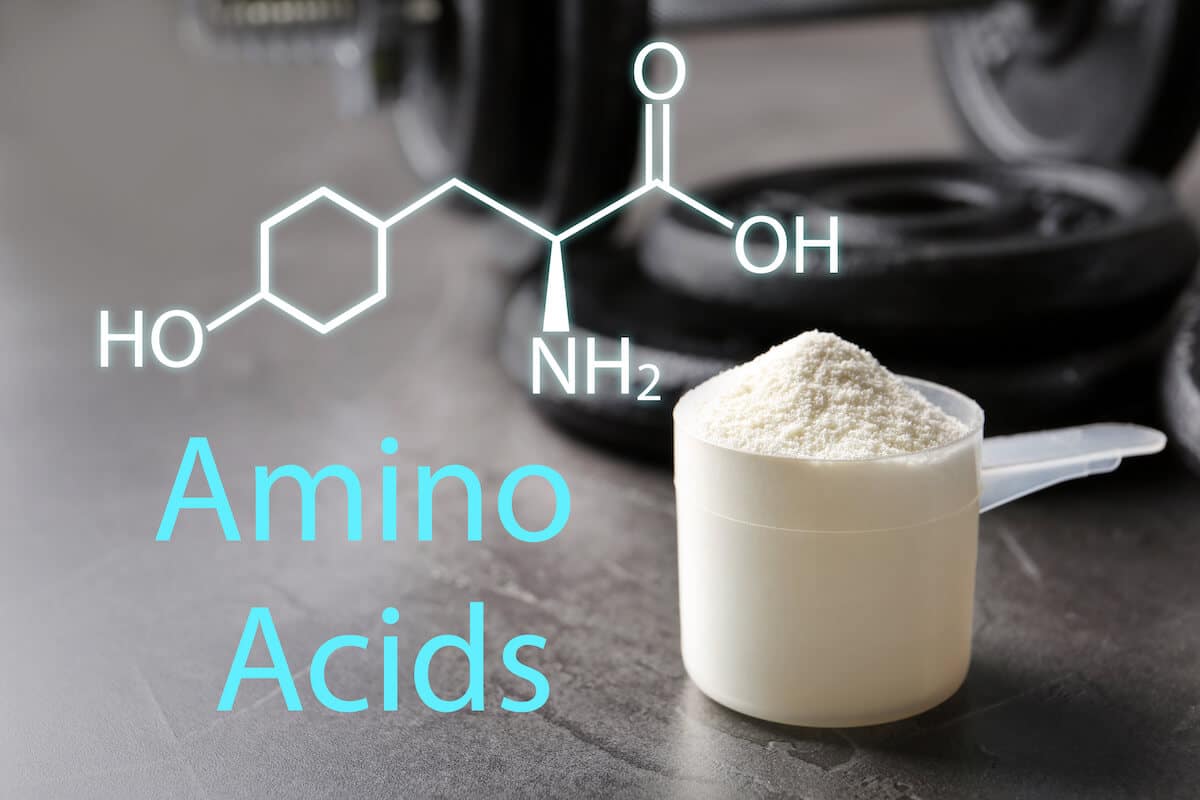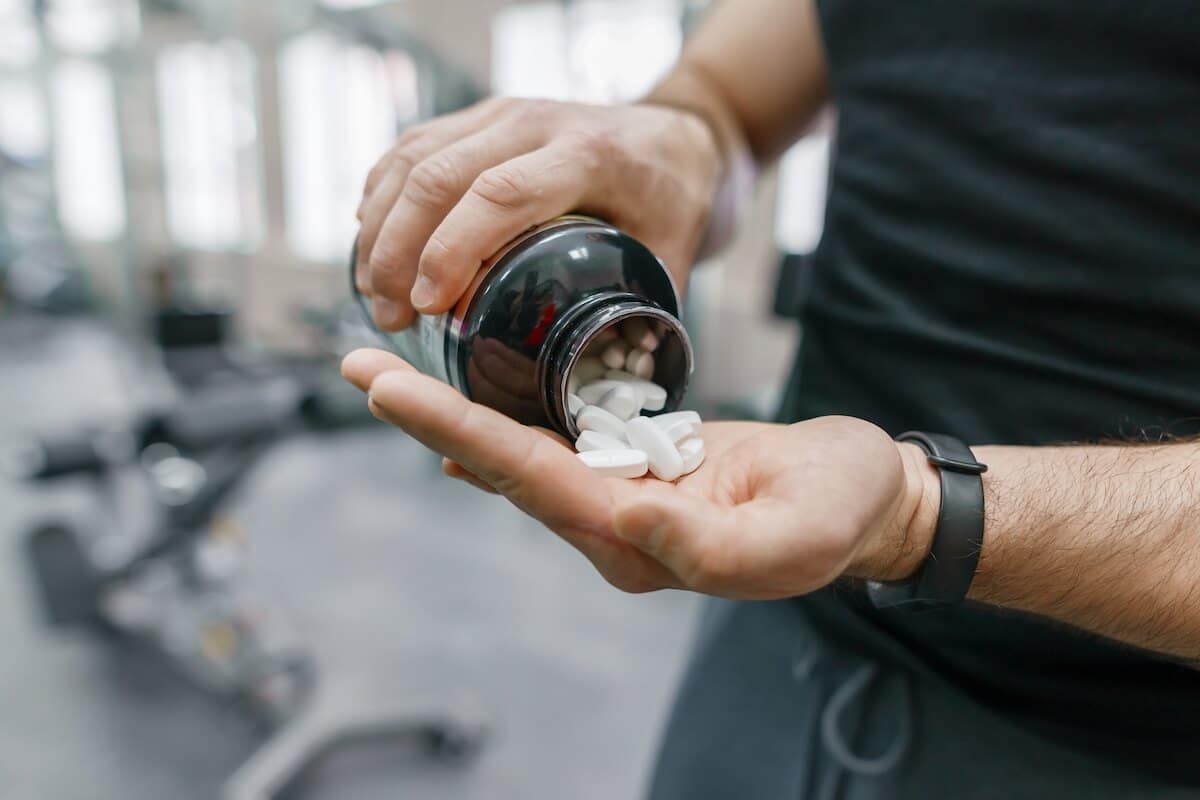
28 Jul Your Guide to the Best Amino Acids for Muscle Growth
While carbohydrates, fats, and proteins are essential nutrients for life and health, protein is the most important for building muscle mass and strength. Amino acids are the building blocks of protein. When you consume protein, your body breaks it down into amino acids to recombine as needed for muscle repair, growth, and other internal processes.
This guide explores the best amino acids for muscle growth and how you get them from whole foods and supplements. We‘ve also highlighted other helpful supplements and some to avoid as you work towards your athletic goals.
About Amino Acids

There are 20 amino acids incorporated in proteins, known as proteinogenic amino acids, and they‘re necessary for the proper function of every cell in your body. Of the 20 proteinogenic amino acids, nine are considered essential amino acids, or EAAs, and your body needs to get them from your food because your body cannot produce them on its own.
Three of the nine essential amino acids are known as branched-chain amino acids or BCAAs. These amino acids have a branched structure and are extra crucial for muscle protein synthesis. The nine essential amino acids are:
- Valine (BCAA)
- Leucine (BCAA)
- Isoleucine (BCAA)
- Histidine
- Lysine
- Methionine
- Threonine
- Phenylalanine
- Tryptophan
A protein containing all nine essential amino acids is known as a complete protein. Animal protein sources (e.g., eggs, fish, poultry, beef, cheese, milk) are complete proteins. Some plant protein sources (e.g., green peas, soybeans, hemp seed, chia seed) also contain complete protein. However, other plant sources include only some of the nine essential amino acids, and are therefore incomplete proteins.
The remaining non-essential proteinogenic amino acids are:
- Glutamine
- Glutamate
- Aspartate
- Arginine
- Alanine
- Proline
- Cysteine
- Asparagine
- Serine
- Glycine
- Tyrosine
There are also over 900 known non-proteinogenic amino acids but most are produced naturally by your body and are not particularly helpful for increasing muscle growth. However, you’ll see a few non-proteinogenic amino acids in this guide, as some offer excellent health benefits.
Protein Intake: The Foundation
Before supplementing your diet with targeted amino acids, it‘s essential to make sure you‘re getting enough protein in your diet. Depending on your activity level, this could be as much as 2 grams of protein per kilogram (or 2.2 pounds) of body weight or as low as 0.8 grams of protein per kilogram of body weight.
We recommend working with a doctor, nutritionist, or dietician to determine how much protein you need to eat daily. A professional can also help you find the best supplements for your lifestyle.
Best Amino Acids for Muscle Growth

Bodybuilders and athletes often turn to amino acids, BCAA supplements, and protein powders (which contain all of the EAAs) to help build lean muscle mass and improve muscle recovery. But dietary supplements aren’t just for the pros — anyone can use them to assist with weight loss and exercise performance goals.
Below, we’ve highlighted the best amino acids for muscle growth to get you started.
Branched-Chain Amino Acids: Valine, Leucine, and Isoleucine
The benefits of BCAAs include increased muscle protein synthesis and growth, decreased muscle soreness, reduced muscle damage during exercise, reduced fatigue, higher energy levels, and prevention of muscle wasting. BCAA supplements contain valine, leucine, and isoleucine, and together, these amino acids produce anabolic effects. The amino acid leucine is the most essential of the three, as it appears to have the most significant anabolic effect.
Anabolism is the process of building new tissues and compounds — muscle tissue in this case — and is necessary for all muscle gains. BCAAs (leucine in particular) promote muscle recovery by stimulating the mTOR (mammalian target of rapamycin) pathway. The mTOR pathway promotes anabolism, energy storage, and energy utilization. Catabolism is the opposite of anabolism, which refers to muscle breakdown or wasting.
BCAA Supplements
BCAA supplements containing all three BCAAs are commonly taken as either a pre-workout or post-workout supplement to support muscle growth and recovery. They‘re the three best amino acids for muscle growth if you supplement a healthy, balanced diet. You can take up to 12 grams of BCAAs daily for up to two years to support muscle growth.
More research on BCAA supplementation for more than two years is needed, but some studies have observed supplementation periods of over six years with no adverse side effects. In addition, larger doses of branched-chain amino acid supplementation should be avoided as they can result in side effects like fatigue, loss of coordination, or stomach problems. If you experience any of these side effects, stop using BCAAs and speak with your doctor before continuing.
Leucine Supplements
Leucine is considered the best BCAA to support muscle growth, as it acts as an anabolic trigger without the presence of the other isoleucine or valine. Therefore, you might see leucine supplements containing just this one BCAA, but it‘s more commonly mixed into protein supplements to improve their amino acid profile.
Avoid taking large doses of leucine, as the recommended daily intake of leucine is 17.7 milligrams per pound of body weight. That translates to 2,655 milligrams (2.6 grams) per day for a 150-pound person. Furthermore, using too much of a single amino acid can interfere with your nitrogen balance, reduce metabolism, and put excess strain on your kidneys.
Beta-Alanine
Beta-alanine is a non-essential amino acid that may help build lean muscle mass while reducing muscle fatigue. Beta-alanine is considered safe at recommended doses of 4-6 grams per day (usually for a minimum of four weeks). The only reported side effect is tingling, which you can regulate with lower doses of beta-alanine.
L-Citrulline
L-citrulline is a non-essential amino acid that may increase athletic performance and muscle gains. Typically sold as L-citrulline malate, a standard dose is 8 grams per day, but recommendations may vary between supplements.
Other Athletic Performance and Muscle-Building Supplements

Aside from the best amino acids for muscle growth, you can add other supplements to your diet to support improved athletic performance and muscle gains. Whey protein and pea protein supplements are an excellent way to ensure you get complete proteins and plenty of amino acids. Both whey and pea proteins are effective for supporting muscle growth and recovery while helping to get the protein you need in your diet.
In addition to protein supplements, these supplements often appeal to those who are bodybuilding or weightlifting to build muscle, but they’re helpful for everyone:
- Beta-hydroxy beta-methylbutyrate: Beta-hydroxy beta-methylbutyrate, or HMB, is a metabolite produced when your body metabolizes leucine. Often sold as a supplement, this molecule may induce anabolism and muscle growth.
- L-carnitine: L-carnitine is a molecule that helps the body transform fat into energy. Also, l-carnitine supplementation may help alleviate muscle injury and improve muscle growth.
Save Your Money: What to Skip
The world of supplements and performance enhancers can be confusing, and not every claim you read is valid. Here are some popular amino acids and supplements that you can skip and keep a bit of extra money in your pocket:
- Glutamine: Glutamine is the most abundant amino acid in your body and is often sold as a supplement. However, while glutamine is said to aid in muscle recovery, existing research does not support this claim.
- L-arginine: L-arginine is a non-essential amino acid that can become essential while building muscle. However, while it is a popular supplement, most current research suggests that this supplement isn’t much of a benefit to healthy, exercising adults.
- Vitamin C and E: Rumors assert that Vitamin C and E enhance muscle growth, but current research does not support these claims.
- Electrolyte drinks: Many sports drinks contain electrolytes, and advertisers claim they improve hydration while replenishing glucose (sugar). However, most nutrition experts recommend a balanced diet and choosing water over electrolyte drinks or mixes. The exception to this rule is for those who regularly experience muscle cramps, although a banana may be a better option than a sugary drink.
Improve Your Muscle Strength and Size With Amino Acids

If you‘re ready to up your supplement game with the best amino acids for muscle growth, we’re here to help. High-quality supplements can help you increase muscle strength and size while improving recovery times. Consult a nutritional specialist to find the best combination for your health and activity level. And always check with your doctor before making significant changes to your diet.
We recommend looking for Ingredient Optimized products designed with improved protein bioavailability to increase how much protein your body can absorb from the supplement.


